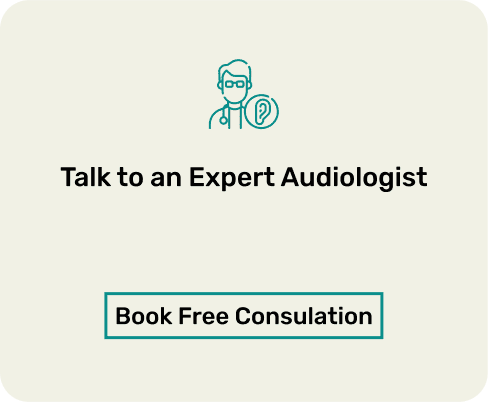The constant ringing started three months ago for Priya, a 45-year-old teacher from Mumbai. What began as a faint whistle has now become a persistent companion that follows her everywhere. If this sounds familiar, you’re not alone. Millions of individuals in India suffer from tinnitus; so, properly understanding what you are going through may help you get relief.
Many people find it to be a life-altering disorder that influences relationships, focus, work output, and sleep. However, there is some good news. Today, we know more about tinnitus than we did years ago, and there are verified treatments available to enable you to take charge of your daily life.
In this comprehensive guide, we go over the different types of tinnitus, their underlying causes, and the comprehensive treatment approaches available.
The Hidden Truth About Tinnitus and Hearing
Understanding the relationship between tinnitus and hearing loss is crucial for effective treatment.
Let’s start with something that might surprise you: 80 to 90% of people with tinnitus actually have some degree of hearing loss, as documented in multiple clinical studies. This often shocks patients because many assume that their hearing is fine.
However, only about 10% of tinnitus sufferers have completely normal pure-tone thresholds when tested.
Even more interesting is this medical reality: a normal audiogram doesn’t necessarily indicate a normal auditory system. Think of it this way: you might pass a basic eye exam but still have subtle vision issues that affect your daily life. The same principle applies to hearing. Your ears and auditory system are incredibly complex, and standard hearing tests don’t always catch every type of damage or dysfunction.
This connection between hearing loss and tinnitus explains why many successful treatments focus on addressing both conditions simultaneously. When hearing care specialists improve your ability to hear external sounds, they often reduce the prominence of internal tinnitus sounds.
What Exactly Is Tinnitus?
Before exploring treatment options, it’s essential to understand what tinnitus actually is and how it affects daily life.
Tinnitus is the perception of sound when there’s no external source creating that sound. It’s not a disease itself, but rather a symptom pointing to various underlying causes. The sounds people describe vary widely: ringing, buzzing, hissing, clicking, roaring, or even musical tones. Some people hear it in one ear, others in both, and some feel like the sound comes from inside their head.
The impact on quality of life can be significant.
- People with severe tinnitus often struggle with sleep, find it difficult to concentrate at work, feel anxious or depressed, and may withdraw from social situations.
- The constant presence of unwanted sound can be exhausting, both mentally and emotionally.
- What makes tinnitus particularly challenging is its subjective nature. Unlike a broken bone that shows up on an X-ray, tinnitus exists in your personal experience.
This can sometimes make people feel like others don’t understand the real impact it’s having on their lives.
Causes of Tinnitus: 6 Main Categories

Medical professionals typically group tinnitus causes into these main categories:
1. Otologic Causes (Ear-Related)
This is the most common category, involving problems with your hearing system itself. Noise-induced hearing loss from exposure to loud machinery, concerts, or gunfire tops the list.
Age-related hearing changes, genetic hearing loss, and infections of the outer, middle, or inner ear all fall into this category. Even earwax buildup can sometimes trigger tinnitus.
2. Neurologic Causes (Brain and Nerve-Related)
Traumatic brain injuries, even seemingly minor ones, can lead to tinnitus. Tumours in the cerebellopontine angle or on the auditory nerve (called acoustic neuromas) are less common but serious causes that require medical attention.
3. Infections
Various infections can trigger tinnitus, including childhood diseases like measles, rubella, and mumps. More serious infections like Lyme disease, meningitis, and syphilis can also affect hearing and cause tinnitus.
4. Head and Neck Issues
Skull fractures, problems with blood flow to the face or head, dental problems, and jaw misalignment (temporomandibular joint disorders) can all contribute to tinnitus. This is why some people notice their tinnitus changes when they clench their jaw or move their neck.
5. Ototoxicity (Toxic Effects on Hearing)
Certain medications, recreational drugs, and chemical exposures can damage hearing structures and cause tinnitus. Some antibiotics, chemotherapy drugs, high doses of aspirin, and loop diuretics are known culprits.
6. Other Health Issues
Pregnancy, hormonal changes, anaemia, blood pressure fluctuations, and stress can all trigger or worsen tinnitus. This category highlights how interconnected our body systems are and why a comprehensive health evaluation is important.
Types of Tinnitus: Understanding Your Experience
As mentioned, not all tinnitus is the same, and recognising the different types helps healthcare professionals provide targeted treatment.
1. Duration-Based Classification
Acute tinnitus appears suddenly and typically lasts less than three months. This might happen after a concert, an ear infection, or a head injury. Chronic tinnitus persists beyond six months and usually requires more comprehensive management strategies.
2. Subjective vs. Objective Tinnitus
Here’s a crucial distinction: 99% of cases of tinnitus are subjective, meaning only you can hear the sounds. This type results from abnormal nerve activity in your auditory system. Your brain perceives sounds that may exist in the physical world around you or may have no external source at all.
Objective tinnitus is rare and fascinating from a medical perspective. It’s caused by actual physical processes near your middle ear, like muscle spasms or blood flow changes.
In these cases, a doctor might actually be able to hear your tinnitus with special equipment. Most pulsatile tinnitus (rhythmic sounds that match your heartbeat) falls into the objective category, though not all objective tinnitus is pulsatile in nature.
3. Occurrence Patterns
Tinnitus can be transient (lasting minutes), temporary (lasting hours to days), occasional (coming and going), intermittent (regular patterns), or constant (always present). Understanding your pattern helps healthcare providers choose the most appropriate treatments.
4. Impact on Daily Life
Medical professionals also categorise tinnitus based on how much it bothers you and whether it primarily affects your hearing (auditory) or other aspects of life like sleep and concentration (non-auditory).
Tinnitus: Evidence-Based Treatment Advances

Treatment approaches for tinnitus have advanced significantly in recent years. We’ve moved beyond simple advice to “learn to live with it.”
1. Modern Hearing Aid Technology
For people with hearing loss and tinnitus, modern hearing aids offer sophisticated solutions. Advanced models include integrated sound generators that can produce white noise, nature sounds, or customised therapy tones.
Some hearing aids now feature “notched therapy,” which specifically targets your tinnitus frequency and may help your brain learn to ignore those sounds over time.
A recent clinical study on Frontiers in Audiology and Otology 2023 demonstrated that people using hearing aids with tinnitus sound support experienced a significant 24-point reduction in their Tinnitus Functional Index scores. These improvements benefited both new hearing aid users and people who already wore hearing aids, suggesting that newer technology provides superior tinnitus relief.
Learn More: Can Hearing Aids Help Cure Tinnitus? – Centre for Hearing® [Wiki]
2. Bimodal Neuromodulation: A Breakthrough
One of the most exciting developments is bimodal neuromodulation, with the Lenire device receiving FDA approval in 2023. This treatment combines customised sounds delivered through headphones with gentle electrical stimulation of the tongue.
Clinical trials have shown promising results, with 80-84% of compliant participants experiencing meaningful improvement in their tinnitus symptoms.
3. Cognitive Behavioural Therapy (CBT)
CBT doesn’t eliminate tinnitus sounds, but it’s highly effective at reducing the distress they cause. This therapy helps you identify and change negative thought patterns about your tinnitus.
CBT is the only intervention for tinnitus to receive strong recommendations in clinical practice guidelines, with benefits primarily focused on managing tinnitus-related distress rather than eliminating the sound itself.
Research consistently shows that CBT significantly improves quality of life for people with tinnitus, even when the sound itself doesn’t change substantially.
4. Sound Therapy and Habituation
Sound therapy works on the principle that external sounds can mask or reduce your awareness of tinnitus. Modern sound therapy goes beyond simple masking. The goal is habituation: training your brain to filter out tinnitus sounds the same way it filters out the hum of an air conditioner or background traffic.
Effective sound therapy provides partial masking, leaving some tinnitus audible so your brain can learn to ignore it. Complete masking actually prevents this learning process and may make tinnitus seem louder when the masking sound stops.
5. Additional Therapeutic Approaches
Acceptance and commitment therapy (ACT) fosters mindfulness and value-aligned actions to address emotional effects, whilst tinnitus retraining therapy combines counselling and sound therapy for habituation.
Neurofeedback shows promise in alleviating tinnitus distress by manipulating alpha and delta wave patterns, though more extensive research is needed to establish its clinical effectiveness.
Treating Tinnitus: The Comprehensive Approach of Centre for Hearing®
At Centre for Hearing®, we’ve spent over four decades helping more than 200,000 people across India address hearing and tinnitus challenges. Our approach recognises that every person’s tinnitus experience is unique, requiring personalised solutions rather than one-size-fits-all treatments.
Advanced Diagnostic Excellence
Our clinics feature European diagnostic equipment that provides exceptional accuracy in identifying the specific characteristics of your tinnitus and any associated hearing loss.
We perform comprehensive evaluations, including pure tone audiometry, speech testing, and impedance measurements to understand how your middle ear functions.
For complex cases, we offer specialised testing, such as ASSR (Auditory Steady State Response) testing, to detect hearing issues that standard tests may miss.
Personalised Treatment Solutions
Our treatment philosophy centres on combining proven approaches for maximum benefit.
- Modern Hearing Aids with Discount: We offer the latest hearing aid technology from leading global manufacturers, including Widex, Signia, ReSound, Oticon, Phonak, and Starkey. These devices feature integrated tinnitus management capabilities that can be programmed with multiple sound therapy options, enabling you to find the combination that works best for you.
- Completely Brand-Agnostic: Our brand-agnostic approach ensures we recommend the right solution for your needs rather than pushing the most expensive option. As platinum-awarded dispensers of all leading hearing aid brands, we have the expertise to match you with the most suitable technology.
- Expert Audiologists in India: Our audiologists, all registered with the Rehabilitation Council of India (RCI), provide comprehensive counselling to help you understand your condition and develop effective coping strategies.
Support Programmes and Hearing Aid Insurance
We’re among the first in India to offer CareFree packages that include comprehensive support for up to five years, covering batteries, adjustments, and ongoing care without additional charges.
- This eliminates the common worry about ongoing costs and ensures you receive consistent support throughout your treatment journey.
- Our services include free consultations, home visits for convenience, and up to seven days’ return facility for hearing aid trials.
- We also provide cochlear implant evaluations, surgeries, and rehabilitation through our network of experienced specialists.
Additionally, we understand that hearing aids represent a significant investment. That’s why Centre for Hearing® offers an exclusive 15-month Protection Plan – the first of its kind in India.
This comprehensive plan protects your hearing aids against theft, loss, or robbery anywhere in India, giving you complete peace of mind for over a year after your purchase.
This protection is available exclusively to Centre for Hearing® customers, reflecting our commitment to going above and beyond for those we serve.
Comprehensive Care Network
Our network spans across 14 cities across India, including:
- Mumbai, Gurgaon, Delhi
- Punjab: Ludhiana, Patiala, Jalandhar
- Chandigarh Tricity Area: Chandigarh, Mohali, Panchkula
To find the nearest centre to your location, click here.
We also have approximately 40 points of sale, and we ensure consistent, high-quality care with our team of over 50 expert audiology professionals.
Our commitment extends beyond the initial consultation and fitting through regular follow-up appointments to monitor your progress, adjust treatments as needed, and introduce new technologies as they become available.
Living Well with Tinnitus
Effective tinnitus management extends beyond clinical treatments to include lifestyle adjustments that support overall well-being.
- Lifestyle modifications that support your overall well-being play a role in successful tinnitus management. Stress management is crucial because stress and tinnitus can create a cycle where tinnitus increases stress, which in turn makes tinnitus seem worse.
- Regular exercise, adequate sleep, and stress-reduction techniques like meditation or yoga, according to some, help reduce their tinnitus perception.
- Limiting caffeine and alcohol, which can sometimes worsen tinnitus, may also be beneficial.
- Support groups, both in-person and online, provide valuable connections with others who understand your experience. Sharing coping strategies and realising you’re not alone in this journey can be tremendously helpful.
Final Note
If tinnitus is affecting your sleep, work, relationships, or overall happiness, you don’t have to continue suffering in silence. Modern treatment options offer more hope than ever before, and early intervention often leads to better outcomes.
At Centre for Hearing®, we understand that behind every case of tinnitus is a person whose life has been disrupted. Our experienced team of audiology professionals is ready to help you understand your specific situation and develop a treatment plan tailored to your needs and lifestyle.
We offer free consultations and hearing aid trials, allowing you to experience potential solutions before making any financial commitments. Our approach prioritises finding the right solution for you, backed by our four decades of experience and commitment to unbiased, patient-centred care.
To book your free consultation today, you can call us at +91 9811227269 or email us at care@centreforhearing.com.




















